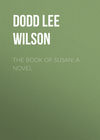Читать книгу: «The Book of Susan: A Novel», страница 5
VI
The following evening, after dinner, Maltby Phar, still a little ruffled by Susan's unexpected vivacities of the night before, retired to the library with pipe and book, and Susan and I sat alone together on the garden terrace. It was dusk. The heavy air of the past week had been quickened and purified by an afternoon thunderstorm. Little cool puffs came to us across a bed of glimmering white phlox, bearing with them its peculiar, loamy fragrance. Smoke from my excellent cigarette eddied now and then toward Susan.
Silence had stolen upon her as the afterglow faded, revealing the first patient stars. Already I had learned to respect Susan's silences. She was not, in the usual sense of uncertain temper, of nervous irritability, a moody child; yet she had her moods – moods, if I may put it so, of extraordinary definition. There were hours, not too frequent to be disturbing, when she withdrew; there is no better word for it. At such times her thin, alert little frame was motionless; she would sit as if holding a pose for a portrait, her chin a trifle lifted, her eyes focusing on no visible object, her hands lying – always with the palms upward – in her lap. I supposed that now, with the veiled yet sharply scented dusk, such a mood had crept upon her. But for once I was mistaken. Susan, this time, had not withdrawn; she was intensely aware.
"Ambo" – the suddenness with which she spoke startled me – "you ought to have lots of children. You ought to have a boy, anyway; not just a girl."
"A boy? Why, dear? Are you lonely?"
"Of course not; with you – and Phil!"
"Then whatever in the world put such a crazy – "
Susan interrupted; a bad habit of hers, never subsequently broken, and due, doubtless, to an instinctive impatience of foreseeable remarks.
"You're so awfully rich, Ambo. You could have dozens and not feel it – except that they'd get in your way sometimes and make your outside cross. But two wouldn't be much more trouble than one. It might seem a little crowded – at first; but after while, Ambo, you'd hardly notice it."
"Possibly. Still – nice boys don't grow on bushes, Susan. Not the kind of brothers I should have to insist upon for you!"
"I'm not so fussy as all that," said Susan. "And it isn't fair that I should have everything. Besides, Ambo, boys are much nicer than girls. Honestly they are."
"Oh, are they! I'm afraid you haven't had much experience with boys! Most of them are disgusting young savages. Really, Susan! Their hands and feet are too big for them, and their voices don't fit. They're always breaking things – irreplaceable things for choice, and raising the devil of a row. Take my word for it, dear, please. I'm an ex-boy myself; I know all about 'em! They were never created for civilized human companionship. Why, I'd rather give you a young grizzly bear and be done with it, than present you with the common-or-garden brother! But if you'd like a nice quiet little sister some day, maybe – "
"I wouldn't," said Susan.
She was silent again for several moments, pondering. I observed her furtively. Nothing was more distant from my desire than any addition, of any age, male or female, to my present family. Heaven, in its great and unwonted kindness, had sent me Susan; she was – to my thinking – perfect; and she was enough. Whether in art or in life I am no lover of an avoidable anticlimax. But Susan's secret purposes were not mine.
"Ambo," she resumed, "I guess if you'd ever lived in Birch Street you'd feel differently about boys."
"I doubt it, Susan."
"I'm sure you'd feel differently about Jimmy."
"Jimmy?"
"Jimmy Kane, Ambo —my Jimmy. Haven't I ever told you about him?"
Guilefully, persuasively, she edged her chair nearer to mine.
It was then that I first learned of Jimmy's battle for Susan, of the bloody but righteous downfall of Giuseppe Gonfarone, and of many another incident long treasured in the junior annals of Birch Street. Thus, little by little, though the night deepened about us, my eyes were unsealed. What a small world I had always lived in! For how long had it seemed to me that romance was – approximately – dead! My fingers tightened on Susan's, while the much-interrogated stars hung above us in their mysterious orbits and – But no, that is the pathetic fallacy. Stars – are they not matter, merely? They could not smile.
"Don't you truly think, Ambo," suggested Susan, "that Jimmy ought to have a better chance? If he doesn't get it, he'll have to work in a factory all his life. And here I am – with you!"
"Yes. But consider, Susan – there are thousands of boys like Jimmy. I can't father them all, you know."
"I don't want you to father them all," said Susan; "and there isn't anybody like Jimmy! You'll see."
It came over me as she spoke that I was, however unwillingly, predestined to see.
Maltby Phar thought otherwise. That night, after Susan had gone up to bed, I talked the thing over with him – trying for an airy, detached tone; the tone of one who discusses an indifferent matter for want of a more urgent. Maltby was not, I fear, deceived.
"My dear Boz," he pleaded, "buck up! Get a fresh grip on your individuality and haul it back from the brink of destruction! If you don't, that little she-demon above-stairs will push it over into the gulf, once for all! You'll be nobody. You'll be her dupe – her slave. How can you smile, man! I'm quite serious, and I warn you. Fight the good fight! Defend the supreme rights of your ego, before it's too late!"
"Why these tragic accents?" I parried. "It's not likely the washlady's kid would want to come; or his mother let him. Susan idealizes him, of course. He's probably quite commonplace and content as he is. No harm, though, if it pleases Susan, in looking him over?"
Maltby took up his book again. He dismissed me. "Whom the gods destroy – " he muttered, and ostentatiously turned a page.
VII
My feeling that I was predestined to see, with Susan, that there wasn't anybody like Jimmy – that I was further predestined to take him into my heart and home – proved, very much to my own surprise and to the disappointment of Susan, to be unjustified. This was the first bitter defeat that Susan had been called upon to bear since leaving Birch Street. She took it quietly, but deeply, which troubled my private sense of relief, and indeed turned it into something very like regret. The simple fact was that much had happened in Birch Street since the tragedy of the four-room house; life had not stood still there; chance and change – deaths and marriages and births – had altered the circumstances of whole families. In short, that steady flux of mortality, which respects neither the dignity of the Hillhouse Avenues nor the obscurity of the Birch Streets of the world, had in its secret courses already borne Jimmy Kane – elsewhere. Precisely where, even his mother did not know; and first and last it was her entire and passionate ignorance as to Jimmy's present location which foiled us. "West" is a geographical expression certainly, but it is not an address.
Jimmy's mother lived with her unwashed brood, you will remember, above old Heinze's grocery store, and on the following afternoon I ran Susan over there for a tactful reconnaissance. At Susan's request we went slowly along Birch Street from its extreme right end to its ultimate wrong, crossing the waste land and general dump at the base of East Rock – historic ground! – mounting the long incline beyond, and so passing the four-room house, which now seemed to be occupied by at least three families of that hardy, prolific race discourteously known to young America as "wops." Throughout this little tour Susan withdrew, and I respected her silence. She had not yet spoken when we stopped at Heinze's corner and descended.
Here first it was that forebodings of chance and change met us upon the pavement, in the person of old Heinze himself, standing melancholy and pensive before the screened doorway of his domain. Him Susan accosted. He did not at first recognize her, but recollection returned to him as she spoke.
"Ach, so!" he exclaimed, peering with mildest surprise above steel-rimmed spectacles. "Id iss you – nod? Leedle Susanna!"
My formal introduction followed; nor was it without a glow of satisfaction that I heard old Heinze assure me that he had read certain of my occasional essays with attention and respect. "Ard for ard – yah! Dot iss your credo," he informed me, with tranquil noddings of his bumpy, oddly shaped skull. "Dot iss der credo of all arisdograds. Id iss nod mine."
But Susan was in no mood for general ideas; she descended at once to particulars, and announced that we were going up to see Mrs. Kane. Then old Heinze snaggily, and I thought rather wearily, smiled.
"Aber," he objected, lifting twisted, rheumatic hands, "dere iss no more such a vooman! Alretty, leedle Susanna, I haf peen an oldt fool like oders. I haf made her my vife." And though he continued to smile, he also sighed.
Our ensuing interview with Frau Heinze, formerly the Widow Kane, fully interpreted this sigh. Prosperity, Susan later assured me, had not improved her. She greeted us, above the shop, in her small, shiny, colored lithograph of a parlor, with unveiled suspicion. Her eyes were hostile. She seemed to take it for granted, did Mrs. Heinze, that we could have no kindly purpose in intruding upon her. A dumpy, grumpy little woman, with the parboiled hands and complexion of long years at the wash-tubs, her present state of comparative freedom from bondage had not lightened her heart. Her irritability, I told Susan after our escape, was doubtless due to the fact that she could not share in old Heinze's intellectual and literary tastes. Susan laughed.
"She wouldn't bother much about that; Birch Street's never lonely, and it's only a step to the State Street movies. No; I think it's corsets."
Corsets? The word threw a flood of light. I saw at once that it must be a strain upon any disposition to return after a long and figureless widowhood to the steel, buckram, and rebellious curves of conventional married life. I remembered the harnesslike creaking of Mrs. Heinze's waistline, and forgave her much.
There was really a good deal to forgive. It was neither Susan's fault nor mine that turned our call into a bad quarter of an hour. I had looked for a pretty scene as I mounted the stairs behind Susan. I had pictured the child, in her gay summer frock, bursting like sunshine into Mrs. Heinze's stuffy quarters – and so forth. Nothing of the kind occurred.
"Who is ut?" demanded Mrs. Heinze, peering forth. "Oh, it's you – Bob Blake's girl. What do you want?" Susan explained. "Well, come in then," said Mrs. Heinze.
Susan, less daunted than I by her reception, marched in and asked at once for Jimmy. At the sound of his name Mrs. Heinze's suspicions were sharply focused. If the gentleman knew anything about Jimmy, all right, let him say so! It wouldn't surprise her to hear he'd been gettin' himself into trouble! It would surprise her much more, she implied, if he had not. But if he had, she couldn't be responsible – nor Heinze either, the poor man! Jimmy was sixteen – a man grown, you might say. Let him look after himself, then; and more shame to him for the way he'd acted!
But what way he had acted, and why, Susan at first found it difficult to determine.
"Oh!" she at length protested, following cloudy suggestions of evil courses. "Jimmy couldn't do anything mean! You know he couldn't. It isn't in him!"
"Isn't ut indeed! Me slavin' for him and the childer ever since Kane was took off sudden – and not a cint saved for the livin' – let alone the dead! Slavin' and worritin' – the way you'd think Jimmy'd 'a' jumped wid joy when Heinze offered! And an easier man not to be found – though he's got his notions. What man hasn't? If it's not one thing, it's another. 'Except his beer, he don't drink much,' I says to Jimmy; 'and that's more than I could say for your own father, rest his soul!' 'My father wasn't a Dutchman,' Jimmy says; givin' me his lip to me face. 'He didn't talk out against the Pope,' he says. 'Nor the Pris'dint,' he says. 'He wasn't a stinkin' Socialist,' he says – usin' them very words! 'No,' I says, 'he was a Demycrat – and what's ut to you? All men'll be blatherin' polytics after hours,' I says. 'Heinze manes no harm by ut, no more nor the rest. 'Tis just his talk,' I says. And after that we had more words, and I laid me palm to his head."
"Oh!" cried Susan.
"I'll not take lip from a son of mine, Susan Blake; nor from you, wid all your grand clothes! I've seen you too often lackin' a modest stitch to your back!"
I hastened to intervene.
"We'll not trouble you longer, Mrs. Heinze, if you'll only be good enough to tell me where Jimmy is now. He was very kind to Susan once, and she wants to thank him in some way. I've a proposition to make him – which might be to his advantage."
"Oh – so that's ut at last! Well, Susan Blake, you've had the grand luck for the likes of you! But you're too late. Jimmy's gone."
"Gone?"
"'Tis the gratitude I get for raisin' him! Gone he is, wid what he'd laid by – twinty-sivin dollars – and no word to nobody. There's a son for ye!"
"But – oh, Mrs. Heinze – gone where?"
"West. That's all I know," said Mrs. Heinze. "He left a line to say he'd gone West. We've not had a scrap from him since. If he comes to a bad end – "
"Jimmy won't come to a bad end!" struck in Susan sharply. "He did just right to leave you. Good-by." With that she seized my arm and swept me with her from the room.
"Glory be to God! Susan Blake – the airs of her now!" followed us shrilly, satirically, down the stairs.
VIII
Maltby's visit came to an end, and for the first time I did not regret his departure. For some reason, which perhaps purposely I left unanalyzed, Maltby was beginning to get a trifle on my nerves. But let that pass. Once he was gone, Phil Farmer drew a long breath and plunged with characteristic thoroughness into his comprehensive scheme for the education of Susan. Her enthusiasm for this scheme was no less contagious than his own, and I soon found myself yielding to her wish to stay on in New Haven through the summer, and let in for daily lessons at regular hours – very much to my astonishment, the rôle of schoolmaster being one which I had always flattered myself I was temperamentally unfitted to sustain.
I soon discovered, however, that teaching a mentally alert, whimsically unexpected, stubbornly diligent, and always grateful pupil is among the most stimulating and delightful of human occupations. My own psychic laziness, which had been long creeping upon me, vanished in this new atmosphere of competition – competition, for that is what it came to, with the unwearying Phil. It was a real renascence for me. Forsaken gods! how I studied – off hours and on the sly! My French was excellent, my Italian fair; but my small Latin and less Greek needed endless attention. Yet I rather preen myself upon my success; though Phil has always maintained that I overfed Susan with æsthetic flummery, thus dulling the edge of her appetite for his own more wholesome daily bread.
In one respect, at least, I disagreed fundamentally with Phil, and here – through sheer force of conviction – I triumphed. Phil, who lived exclusively in things of the mind, would have turned this sensitive child into a bemused scholar, a female bookworm. This, simply, I would not and did not permit. If she had a soul, she had a body, too, and I was determined that it should be a vigorous, happy body before all else. For her sake solely – for I am too easily an indolent man – I took up riding again, and tennis, and even pushed myself into golf; with the result that my nervous dyspepsia vanished, and my irritability along with it; with the more excellent result that Susan filled and bloomed and ate (for her) three really astonishing meals a day.
It was a busy life – a wonderful life! Hard work – hard play – fun – travel… Ah, those years!
But I am leaping ahead – !
Yet I have but one incident left to record of those earliest days with Susan – an incident which had important, though delayed, results – affecting in various ways, for long unforeseen, Susan's career, and the destiny of several other persons, myself among them.
Sonia, Susan's little Russian maid, was at the bottom of it all; and the first hint of the rather sordid affair came to me, all unprepared, from the lips of Miss Goucher. She sought me out in my private study, whither I had retired after dinner to write a letter or two – a most unusual proceeding on her part, and on mine – and she asked at once in her brief, hard, respectful manner for ten minutes of my time. I rose and placed a chair for her, uncomfortably certain that this could be no trivial errand; she seated herself, angularly erect, holding her feelings well in hand.
"Mr. Hunt," she began, "have I your permission to discharge Sonia?"
My face showed my surprise.
"But Susan likes her, doesn't she, Miss Goucher? And she seems efficient?"
"Yes. A little careless perhaps; but then, she's young. It isn't her service I object to."
"What is the trouble?"
"It is a question of character, Mr. Hunt. I have reason to think her lacking in – self-respect."
"You mean – immoral?" I asked, using the word in the restricted sense which I assumed Miss Goucher, like most maiden ladies, exclusively attached to it. To my astonishment Miss Goucher insisted upon more definition.
"No, I shouldn't say that. She tells a good many little fibs, but she's not at heart dishonest. And I'm by no means certain she can be held responsible for her weakness in respect to men." A slight flush just tinged Miss Goucher's prominent cheek bones; but duty was duty, and she persevered. "She has a bad inheritance, I think; and until she came here, Mr. Hunt, her environment was always – unfortunate. If it were not for Susan, I shouldn't have spoken. I should have felt it my duty to try to protect the child and – However," added Miss Goucher, "I doubt whether much can be done for Sonia. So my first duty is certainly to Miss Susan, and to you."
Susan's quiet admiration for Miss Goucher had more or less puzzled me hitherto, but now my own opinion of Miss Goucher soared heavenward. Why, the woman was remarkable – far more so than I had remotely suspected! She had a mind above her station, respectable though her station might well be held to be.
"My dear Miss Goucher," I exclaimed, "it is perfectly evident to me that my interests are more than safe in your keeping. Do what you think best, by all means!"
"Unfortunately, Mr. Hunt," said Miss Goucher, "that is what I cannot do."
"May I ask why?"
"Society would not permit me," answered Miss Goucher.
"Please explain," I gasped.
"Sonia will cause a great deal of suffering in the world," said Miss Goucher, the color on her cheek bones deepening, while she avoided my glance. "For herself – and others. In my opinion – which I am aware is not widely shared – she should be placed in a lethal chamber and painlessly removed. We are learning to 'swat the fly,'" continued Miss Goucher, "because it benefits no one and spreads many human ills. Some day we shall learn to swat – other things." Calmly she rose to take her leave. Excitedly eager, I sprang up to detain her.
"Don't go, Miss Goucher! Your views are really most interesting – though, as you say, not widely accepted. Certainly not by me. Your plan of a lethal chamber for weak sisters and brothers strikes me as – well, drastic. Do sit down."
Again Miss Goucher perched primly upright on the outer edge of the chair beside my own. "I felt bound to state my views truthfully," she said, "since you asked for them. But I never intrude them upon others. I'm not a social rebel, Mr. Hunt. I lack self-confidence for that. When I differ from the received opinion I always suspect that I am quite wrong. Probably I am in this case. But I think society would agree with me that Sonia is not a fit maid for Susan."
"Beyond a shadow of doubt," I assented. "But may I ask on what grounds you suspect Sonia?"
"It is certainly your right," replied Miss Goucher; "but if you insist upon an answer I shall have to give notice."
"Then I shall certainly not insist."
"Thank you, Mr. Hunt," said Miss Goucher, rising once more. "I appreciate this." And she walked from the room.
It was the next afternoon that Susan burst into my study without knocking – a breach of manners which she had recently learned to conquer, so the irruption surprised me. But I noted instantly that Susan's agitation had carried her far beyond all thought for trifles. Never had I seen her like this. Her whole being was vibrant with emotional stress.
"Ambo!" she cried, all but slamming the door behind her. "Sonia mustn't go! I won't let her go! You and Miss Goucher may think what you please – I won't, Ambo! It's wicked! You don't want Sonia to be like Tilly Jaretski, do you?"
"Like Tilly Jaretski?" My astonishment was so great that I babbled the unfamiliar name merely to gain time, collect my senses.
"Yes!" urged Susan, almost leaping to my side, and seizing my arm with tense fingers. "She'll be just like Tilly was, along State Street – after her baby came. Tilly wasn't a bit like Pearl, Ambo; and Sonia isn't either! But she's going to have a baby, too, Ambo, like Tilly."
With a wrench of my entire nervous system I, in one agonizing second, completely dislocated the prejudices of a lifetime, and rose to the situation confronting me. O Hillhouse Avenue, right at both ends! How little you had prepared me for this precocious knowledge of life – knowledge that utterly degrades or most wonderfully saves – which these children, out toward the wrong end of the Birch Streets of the world, drink in almost with their mothers' milk! How far I, a grown man – a cultured, sophisticated man – must travel, Susan, even to begin to equal your simple acceptance of naked, ugly fact – sheer fact – seen, smelt, heard, tasted! How far – how far!
"Susan," I said gravely, "does Miss Goucher know about Sonia?"
"I don't know. I suppose so. I haven't seen her yet. When Sonia came to me, crying – I ran straight in here!"
"And how long have you known?"
"Over a week. Sonia told me all about it, Ambo. Count Dimbrovitski got her in trouble. She loved him, Ambo – her way. She doesn't any more. Sonia can't love anybody long; he can't, either. That's why his wife sent Sonia off. Sonia says she knows her husband's like that, but so long as she can hush things up, she doesn't care. Sonia says she has a lover herself, and Count Dim doesn't care much either. Oh, Ambo – how stuffy some people are! I don't mean Sonia. She's just pitiful – like Tilly. But those others – they're different – I can feel it! Oh, how Artemis must hate them, Ambo!"
Susan's tense fingers relaxed, slipping from my arm; she slid down to the floor, huddled, and leaning against the padded side of my chair buried her face in her hands.
Very quietly I rose, not to disturb her, and crossing to the interphone requested Miss Goucher's presence. My thoughts raced crazily on. In advance of Miss Goucher's coming I had dramatized my interview with her in seven different and unsatisfactory ways. When she at last entered, my temple pulses were beating and my tongue was stiff and dry. Susan, except for her shaken shoulders, had not stirred.
"Miss Goucher," I managed to begin, "shut the door, please… You see this poor child – ?"
Miss Goucher saw. Over her harsh, positive features fell a sort of transforming veil. It seemed to me suddenly – if for that moment only – that Miss Goucher was very beautiful.
"If you wouldn't mind," she suggested, "leaving her with me?"
Well, I had not in advance dramatized our meeting in this way. In all the seven scenes that had flashed through me, I had stood, an unquestioned star, at the center of the stage. I had not foreseen an exit. But I most humbly and gratefully accepted one now.
Precisely what took place, what words were said there, in my study, following my humble exit, I have never learned, either from Miss Goucher or from Susan. I know only that from that hour forth the bond between them became what sentimentalists fondly suppose the relationship between mother and daughter must always be – what, alas, it so rarely, but then so beautifully, is.
I date from that hour Miss Goucher's abandonment of her predilection for the lethal chamber; at least, she never spoke of it again. And Sonia stayed with us. Her boy was born in my house, and there for three happy years was nourished and shamelessly spoiled; at the end of which time Sonia found a husband in the person of young Jack Palumbo, unquestionably the pick of all our Hillhouse Avenue chauffeurs. Their marriage caused a brief scandal in the neighborhood, but was soon accepted as an authentic and successful fact.
Chance and change are not always villains, you observe; the temperamental Sonia has grown stout and placid, and has increased the world's legitimate population by three. Nevertheless, it is the consensus of opinion that little Ivan, her first-born, is the golden arrow in her quiver – an opinion in which Jack Palumbo delightedly, if rather surprisingly, concurs.
And so much for Sonia… Let the curtain quietly descend. When it rises again, six years will have passed; good years – and therefore unrecorded. Your scribe, Susan, is now nearing forty; and you – Great heavens, is it possible! Can you be "going on" – twenty?
Yes, dear – You are.































